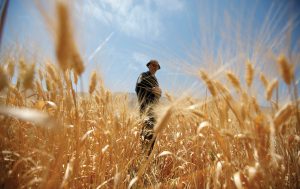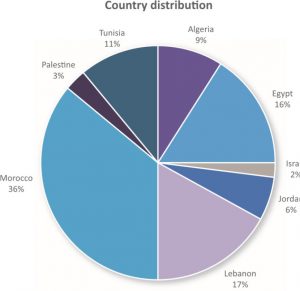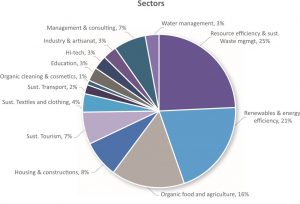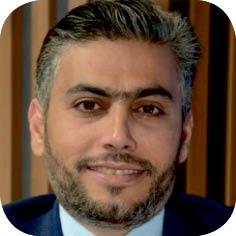With a growing population of more than 800 million inhabitants, the Mediterranean region has been identified as one of the main climate-change hotspots in the world. This is due in part to natural conditions that include water scarcity, demographic change (which, in turn, includes a concentration of inhabitants and economic activities in coastal areas), changing consumption patterns that include growing energy needs, and reliance on climate-sensitive agriculture, etc. The region is expected to face even more severe climaterelated vulnerabilities, such as extreme weather events (droughts, floods, etc.), an increase in soil erosion and desert areas, and a rise in sea level, among other things, resulting in a range of negative economic, social, and environmental impacts. These phenomena affect the quality of the air we breathe, access to freshwater resources, land availability for agriculture and livestock, urban infrastructure, and tourism.

The Mediterranean region is one of the 25 “hotspots” throughout the world that are impacted by climate change. With a rapidly growing population and more than 180 million people affected by water poverty, joining forces to address this common challenge is of utmost importance. To face this growing concern and the huge challenges it presents, the region needs to work collectively on a strategy in order to build a better future and provide more opportunities for the young generation. Work should include creating business modules based on resilience, especially at the local level where conflicts affect the socio-economic situation. Palestine, in particular, needs this strategy in order to build green entrepreneurships that will help overcome the challenges that are specifically caused by the occupation, which effectively controls the economy.
As an active entity in the Mediterranean region, Palestine offers huge potential for sustainable and environmentally friendly development. Palestine is in position to take advantage of various key actors that actively support the transition to an inclusive, circular, and green economy. Green entrepreneurship can be defined as a way of developing economically viable and socially empowering business solutions to overcome environmental challenges. Lessons and experience from across the Mediterranean region can be learned and exchanged as both the southern and northern regions have already developed their capacity and measures that lead to an inclusive environment that supports green entrepreneurships.

What is needed in Palestine is the enhancement of competencies for a variety of (public and private) entities in order to have access to international climate financing which, in turn, is instrumental in job creation. The water, energy, and solid-waste-management sectors should take note. The financing will help address challenges both on the mainland and in coastal areas by converting waste to products or following a nexus approach in converting saline water into freshwater in areas affected by salinity such as the Jordan Valley or the Gaza Strip. Another project example is converting traditional farming into high-value-crop farming. Similar projects were successful in Tunisia, Algeria, and Spain, among other locations. Such development projects will help ensure badly needed Palestinian economic resilience.
Much hard work is necessary in order to achieve this goal. For starters, new economic models should be introduced, in addition to a fair social welfare strategy and an environmentally friendly attitude. Green entrepreneurship can help tackle environmental and social issues, especially in the case of Palestine, which faces many problems, the least of which are restrictions on exporting material. A shift toward a green and circular economy would create jobs and contribute to changing the production and consumption patterns of our society.
A green entrepreneur would grasp business opportunities that arise in the context of global and local Palestinian environmental and political challenges. A green entrepreneur would also consider environmental, economic, and social axes in core businesses and would provide innovative solutions – through a workable business model – to the way goods and services are produced and consumed. Palestine should look around to similar green products and services that are emerging in the MENA (Middle East North Africa) region which potentially can be an ocean of opportunities for any entrepreneur attuned to the needs of consumers and capable of anticipating outcomes. It needs to be said that success is not limited to capacity and understanding what is available and how to reach it; it requires a paradigm shift through the introduction of new government policies at every level that include legal and institutional enabling mechanisms. For this to work in Palestine, there must be a regional network set up to exchange best practices and conditions conducive to success.

When all is ready, a funding and financing mechanism for green enterprises would commence with an incentive-based approach. Figure 1 shows how to increase the current engagement from 3 percent to 30 percent. Figure 2 shows work across several key economic sectors, including agriculture, industry, and waste-management services as well as solar and water reuse.
A quick look at the figures above shows the opportunities available to Palestine given that it is last on the list of the SEMED countries; in other words, Palestine has access to less than 3 percent of green funds. Morocco, on the other hand, has access to 36 percent. This is essentially an open call for Palestine and other countries to work on the “enablers,” which again are a combination of support at various levels. In addition, institutional and financial tools must be adopted to allow green startups to engage in development, test their innovations in the market, and achieve sustainable business models, as well as establish networks and exchanges. Also helpful to green entrepreneurs is introducing special university-level curricula and programs, as well as setting up green incubators through the support of corporate social and environmental responsibilities.
Another suggestion of how to integrate the green economy into national policy is to engage local banks in the region to make better use of available global funds, including guarantee schemes provided by the European Union and other active financial instruments. With these measures, Palestine would gain access to funding, guarantee schemas, and technical assistance from regional and international initiatives such as the European Fund for Sustainable Development and many other donor institutions. These efforts would systematically support the setting up of a national green venture capital fund to support green startups to work in innovative green market and product chains.
This article solely reflects the opinion of the author and not that of any particular institution.


